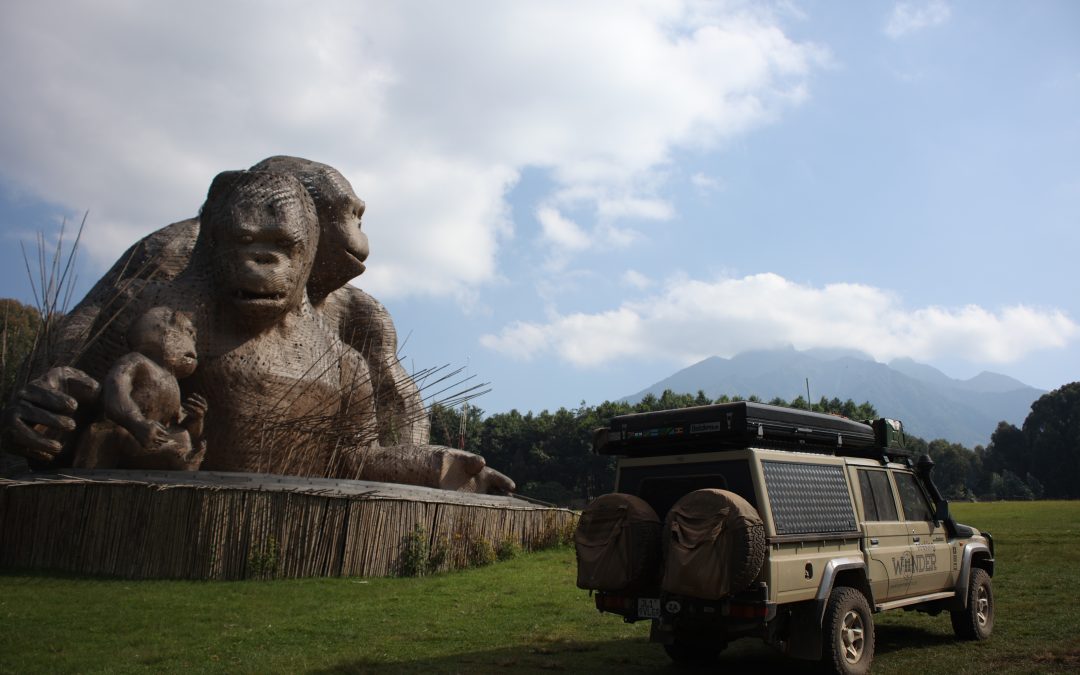
Crossing a thousand hills
When you travel, remember that a foreign country is not designed to make you comfortable. It is designed to make its own people comfortable. When Clifton Fadiman noted this, he might as well have been describing overland travel through Rwanda. As far as African states are concerned, Rwanda is truly unique. After spending a month in neighbouring crazy-but-cool Uganda, we meandered through this tiny landlocked country in Baloo. Having been fortunate enough to enjoy a fly-in Rwandan trip a few years ago, the expectations of a road trip through this developing nation were high. As it turned out, overlanding through it proved very different. We encountered ups and down aplenty, both literally and figuratively. Here are a few of the inclines and declines that you can expect in the land of a thousand hills.



Headliner Act
This tiny landlocked country is no stranger to making international headlines. The well-known Tutsi genocide of 1994 strikes at the very core of modern Rwandan society. Whether driving through the rural areas or just visiting Kigali, memorial sites dot the landscape. It is recommended to visit some of these to understand more about the whats and whys, but be prepared for some very graphic content that emphasize just what humans can truly be capable of – and not long ago at that.
These days Rwanda is making headlines for much more positive and uplifting reasons. It is proudly one of the fastest growing economies in Africa and foreign investors are competing to get in on the act. At ground level this is also apparent. We found modern and well-designed buildings dotting Kigali, new developments under construction everywhere, first-world clinics and hospitals popping up throughout, and entrepreneurs advertising startup micro-businesses in almost every town.



Spring Cleaning
The first comment most travellers give is just how clean Rwanda is, and for good reason. Driving through most other parts of Africa, one becomes semi-accustomed to everyday scenes of grimes against humanity: heaps of yesterday’s garbage burning in the backyard; rivers foaming with Omo and goodness-knows-what-else; Marabou Storks ambling along sidewalks, picking their way through mounds of delicious litter.
None of that will do for Rwanda. For starters, they have an anti-plastic-bag policy that is well enforced. Your car gets inspected at the border, all groceries come in paper bags, and even the plastic baggage wraps of paranoid South African passengers must be left at the airport. Then there are the community clean-up days. Started after the genocide as a form of community service that involves all of society, this is a very inspiring initiative. Driving through Rwandan towns on cleaning days we witnessed young and old joined in the act of washing out gutters, sweeping pavements and cleaning streets. We even saw police cars patrolling the fringes of villages to make sure everyone is busy cleaning. Imagine that back home in South Africa.



Mighty Dollars
As elsewhere in Africa, the Rwandans prefer squeezing you with the mighty US Dollar over the local currency. In comparison with a visit only six years ago, the cost of most things have also dramatically increased. At overlander or budget traveller level this means that their beautiful national parks are essentially out of reach. To put it into perspective, a day in Akagera or Nyungwe is even more expensive than the famously high cost of a day in the Serengeti! Along with the general lack of camping grounds in lieu of lodges and hotels, it seems that the country’s tourism is simply not aimed towards us mortals that eat local supermarket food and are okay with cold showers.



Coffee and Adventure
We entered the country in the North close to Ruhengeri and visited the brand-new Ellen DeGeneres Campus of the Dian Fossey Gorilla Fund, a beautifully designed building that was high on our must-see list. The campus is a centre for gorilla conservation and scientific research and involves beautiful exhibits to learn more about mountain gorillas. The building itself is also inspiring. Built from local volcanic rock and bamboo, it blends beautifully with the surrounding flowing hills with views over the mountains which the Rwandan gorillas call home. Taking the volcanic back roads, we then bumped along the foothills of the Virungas. Here we stopped for enormous King Kong-size artworks made from papyrus and sipped delicious cappuccinos made from local beans by baristas that would challenge any in Europe.
Our fondness of the road less taken (or our exhaustive search for budget camping) took us onto the Congo-Nile trail. This confusingly-named trail traverses the hills along the shores of Lake Kivu, being the water shedding ridge along which water either drains into Congo (to the west) or Nile (to the east) systems. It is mostly a hiking or cycling trail, but parts can also be driven by 4×4. We thus found ourselves rattling along happily, crossing mountain streams on dodgy-looking wooden planks (if the vrot bakkie in front could pass, so can we, right?). We spent a few nights at one of the trail base stations on the shores of the lake, doubling as a local coffee washing station. Between coffee shrubs, heaps of freshly plucked coffee fruit and views of the many tranquil islands and coves of the lake, it was a fascinating place to set up office and catch up on chores.
Ki(n)gali
Following millions of road bends and many Valoid tablets, our route took us through the Nyungwe forest. This is one of the most beautiful forests we have ever seen and we would have loved to stay longer and explore if only an American fly-in tourist could take pity on us. Unfortunately none did, so we were content and happy with views over the steamy and rolling hills of primeval forest, roadside L’Hoest’s monkeys and beautiful birds such as the Lühder’s Bushshrike.
Fuelled by yet more well-crafted cappuccinos, we made our way to Kigali where we set up shop in an Airbnb flat for a week. We mostly used the time to recover from flu and catch up on work, but in between also explored this wonderful city. Very unlike most African cities, Kigali is clean, safe, well-structured, without too much traffic, and has a very modern air about it owing to the many new developments around. We shopped for fresh produce in well-stocked supermarkets, got bread and real cheese(!!) from great delis, and sampled (you guessed it) cappuccinos at street cafes. A highlight was also a lunch at Heaven, a restaurant with amazing fusion cuisine. They also have a remarkably inspiring back-story which the owner wrote a book about – a book which just happened to be the very first gift I ever gave Simoné.

When we eventually made our way to another border to exit back into Tanzania, we were left with mixed feelings about Rwanda. There are certainly many challenges that might make an overland journey through it difficult, such as sleeping in hotel parking lots or having to miss out on some of the wonderful parks. However, the country is blessed with many truly unique facets that can mostly be summed up as inspiring. From its cleanliness and commitments to righting wrongs from the past, to its modern developments, natural beauty and conservation ethics. So, will we be back to cross these hills again one day? If we can, yes. For all these things – and the cappuccinos!



Some helpful trip tips:
- Borders
- Get the East-African Tourist visa if you plan to visit Rwanda, Uganda and Kenya together, but remember it gets nullified once you exit to any other neighbouring country. It is better to get it online, but not impossible at the borders.
- Two items foremost on the car-search agenda at Rwandan borders: plastic bags and drones.
- National parks
- African Parks is managing both the Akagera and Nyungwe Forest National Parks and both are truly beautiful, although their park fees have escalated exponentially over the last year or two.
- The main road through the Nyungwe Forest is public so it is possible admire this beautiful forest without the park fees.
- Camping is possible inside Akagera, and for something very different, SA’s Lowveld Trails Company offer seasonal wilderness hiking trails inside the park (lowveldtrails.co.za).
- Gorillas
- Rwanda’s mountain gorillas are in the Volcanoes National Park in the north. It is easily accessible via Ruhengeri and the trekking not as strenuous as in Uganda.
- Rwanda’s gorilla permits now cost more than double those of Uganda.
- There is a brand-new research and educational centre just outside the park sporting a world-class building and beautiful exhibits to learn more about mountain gorillas (https://gorillafund.org/ellencampus/).
- Kigali
- There are no real camping options – an Airbnb apartment might be your best bet.
- The National Genocide Memorial Museum is recommended to understand more about Rwanda’s modern history, but be prepared for some very graphic and emotionally stirring exhibitions.
- Our favourite restaurant is Heaven – fantastic cuisine with a fantastic story (heavenrwanda.com).
- Campsites
- Rwanda doesn’t generally offer camping – overlanders need to manage their expectations! Backpackers with ground tents are catered for in some places, but rooftop tents not as much.
- You will usually be able to find hotels or lodges that allow you to camp in their parking areas, using an open room’s ablutions.
- The general exception is the region on the shores of Lake Kivu, where the various basecamps intended for hikers/bikers on the Congo-Nile trail also offer good and cheap camping. https://kivubelt.travel/congo-nile-trail/
